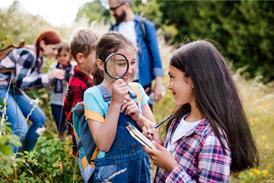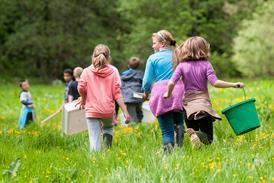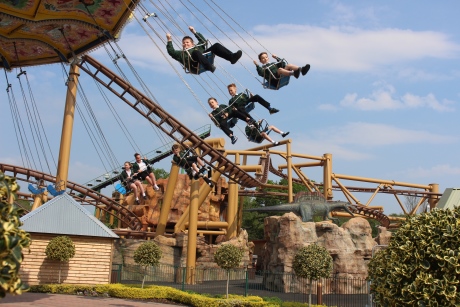
There used to be a time when a school visit to a theme park offered a day out on the rides with few educational benefits. Nowadays, however, a trip to a theme park such as Paultons Park in Hampshire can relate to subjects including Physics, Biology and Business Studies.
Complete with its own interactive learning lab, also known as Professor Blast’s Learning Lab, Paultons Park provides a range of workshops based around the theme park’s attractions.
An educational visit to Paultons Park is suitable for pupils in Key Stage 1 through to Key Stage 5. Its workshops predominantly support Primary school studies, however the park also provides bespoke Business Studies presentations, which are suited to Key Stage 3 and beyond.
Here School Travel Organiser takes a look at the workshops aimed towards Key Stage 1 and 2 pupils and discovers how they combine fun at a theme park with National Curriculum-linked studies.
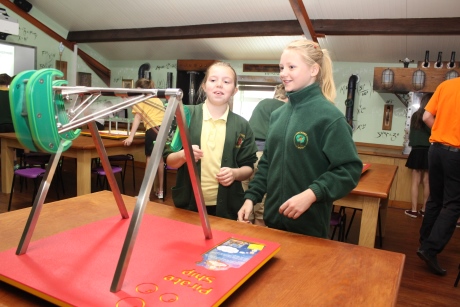
Rollercoaster Physics
This Physics-based workshop targeted towards Key Stage 2 students is new for this year and gets pupils to explore and discover the forces and motions found on the theme park’s rides by using K’NEX models of rollercoasters and setting up their own experiment in Professor Blast’s Learning Lab.
Led by the Paultons Park’s education team, students will investigate gravity, friction and air resistance, and learn how the forces impact the design of a rollercoaster ride.
The workshop is directly linked to the curriculum, in particular the Year 5 programme of study which requires students to be taught how ‘unsupported objects fall towards the earth because of the force of gravity acting between the earth and the falling object.’
Feel the Force
Suitable for Key Stage 1 and 2 students Feel the Force workshops see pupils learning about the forces and motions of each ride, before getting to experience them themselves.
According to Paultons Park’s Andrew Chapman the workshop is a big hit with Primary school students, with the combination of education and enjoying the rides a popular way to learn.
The session predominantly takes place within the park and includes a tour.
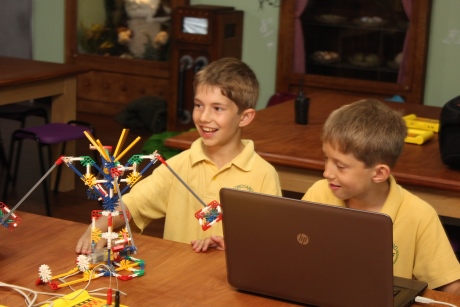
Ride Programming
Ride Programming, suitable for Key Stage 2, as well as Key Stage 3, is another session held within Professor Blast’s Learning Lab.
Using a K’NEX model of the Sky Swinger – a ride at the theme park – as well as a laptop, children will learn to program their rides to spin forwards and backwards.
As an added challenge students will also be asked to see if they can add flashing lights and music to the ride experience.
Meet the Minibeasts
As well as workshops focusing on Physics, Biology workshops, based on adaptations and habitats, are also offered.
Meet the Minibeasts lets students come face-to-face with a range of live invertebrates, including cockroaches, stick insects, millipedes and locusts.
Designed to suit animal-based Science topics for students in Key Stage 1 and 2, the workshop differs slightly depending on the age of the group.
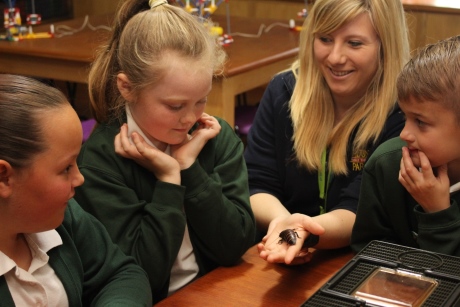
For Key Stage 1, pupils will be tasked with identifying the different types of insects. They will discover their habitats and explore the difference between carnivores, omnivores and herbivores.
For Key Stage 2, the session is spilt into two sections. The first section will be focused on classification. For the second section, the focus shifts depending on the year group and the different Science curriculum requirements.
For example, Year 3 pupils will explore how insects protect themselves against predators in their natural habitats, Year 4 students will learn how insects contribute to natural food chains, whilst Year 5 students will discuss how life cycles differ across the animal kingdom, and how an insect’s life cycle will differ from that of a mammal or an amphibian.
Finally the Year 6 tailored workshop will look at how insects have adapted physically to allow them to live in their natural environment.
Additional Biology-based workshops at Paultons Park include Animal Adaptation and Rainforest Ranger, which are both targeted towards Primary school students.
For more information e-mail education@paultons.co.uk or visit paultonspark.co.uk/education.

